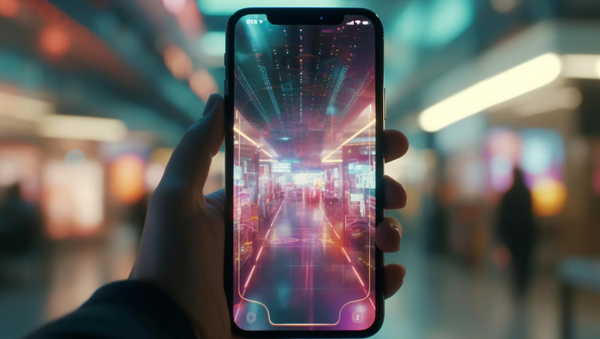The Impact of 5G on Mobile App Development: Speed, Opportunities, and Challenges
The impact of 5G on mobile app development is transformative. It significantly improves over 4G, including faster data transfer speeds, lower latency, and increased capacity.
5G enables seamless, high-quality experiences with quicker loading times, smoother animations, and real-time interactions. The technology also allows integration of emerging technologies like AR, VR, and MR into mobile apps, offering immersive user experiences.
Additionally, mobile app development companies play a vital role in harnessing the potential of 5G. They leverage the technology's enhanced connectivity to create an app that interact with a wide array of devices on the Internet of Things (IoT).
As 5G continues to expand, these companies are at the forefront of revolutionizing mobile app experiences on a global scale.
Effect of Speed on the Mobile App Development
5G's speed revolutionizes mobile app development, enhancing performance and capabilities.
Mobile app development companies and software development agencies leverage the technology's faster data transfer and lower latency to create an app, offering seamless user experiences and improved functionality.
Faster data transfer and lower latency result in quicker loading, real-time responses, and smooth media streaming. So if you're exploring adding a HIPAA-compliant video SDK to your mobile app or other multimedia elements, 5G can have a great impact on ensuring a seamless and smooth user experience.
This boosts user satisfaction and engagement. 5G also empowers apps to handle complex tasks on the device and integrate emerging tech like AR and VR. As 5G networks expand, developers can create high-performance apps for tech-savvy users.
Opportunities to develop apps with 5G Technology:
The advent of 5G technology in the mobile landscape brings forth numerous opportunities for mobile app development.
Here are some of the key opportunities that 5G presents:
- Enhanced User Experience: Faster data speeds and lower latency enable mobile app developers to create smoother user experiences, with quick loading, instant responses, and buffer-free media streaming, leading to increased user satisfaction and engagement.
- Real-time Interactions: 5G's low latency allows for real-time interactions between mobile apps and users. This opens up opportunities for real-time collaboration, live-streaming, online gaming, and other applications that rely on instant data exchange and response. Moreover, with 5G technology, the possibilities for low latency streaming have expanded exponentially.
- Integration of Emerging Technologies: 5G enables the integration of emerging technologies (AR, VR, MR) into mobile apps, creating immersive experiences in gaming, education, marketing, and healthcare.
- Internet of Things (IoT) Growth: 5G fosters IoT growth, allowing mobile apps to control and interact with numerous IoT devices, leading to innovative applications in smart home, industrial, and healthcare sectors.
- High-Quality Media Content: Mobile apps can now deliver high-quality video and audio content with 5G's faster speeds. Streaming services, video conferencing apps, and entertainment platforms can provide users with seamless, high-definition media experiences.
- Cloud-Based Services and Edge Computing: 5G improves connectivity, enabling seamless integration of cloud services into mobile apps for efficient data access, real-time updates, and synchronization.
- Location-Based Services: 5G's lower latency enables accurate location-based services with real-time navigation, geolocation-based marketing, and personalized content, enhancing user engagement and tailored experiences.
- Optimized Mobile Gaming: 5G's faster speeds and lower latency enhance mobile gaming with real-time interactions, high-quality graphics, and reduced lag, expanding possibilities for gaming enthusiasts.
- Remote Work and Telemedicine: With 5G, remote work and telemedicine apps provide smoother video conferencing, real-time data exchange, and faster access to critical information, enhancing productivity and healthcare services.
- Data-Intensive Applications: 5G's faster data speeds enable efficient handling of data-intensive apps, supporting large datasets, complex computations, and AI-driven functionalities on mobile devices.
In conclusion, 5G offers opportunities for improved user experiences and cutting-edge tech integration in mobile app development. Developers can create innovative, high-performance apps that meet evolving user needs.
However, challenges such as network infrastructure, security, and device compatibility must be addressed to fully harness 5G's potential and deliver optimal app experiences.
Here are a few challenges that need to be addressed:
- Network Infrastructure Requirements: Implementing 5G requires robust infrastructure, which can be costly and time-consuming, especially in areas with limited coverage. App developers must consider 5G availability in target markets for optimal app performance.
- Potential Security Concerns: With increased data speeds and connectivity, there may be an elevated risk of security breaches and cyberattacks. Mobile app developers must prioritize security measures and implement robust encryption to safeguard user data and privacy.
- Device Compatibility: While newer devices are 5G-enabled, a significant portion of the existing mobile devices may not support 5G technology. Developers need to ensure backward compatibility with 4G and older networks to reach a broader user base.
- Battery Consumption: Faster data speeds and real-time interactions can cause higher battery consumption. Developers must optimize app performance, reduce background activities, and enhance the overall user experience by mitigating battery drain.
- Data Usage and Costs: Faster data speeds may lead to increased data consumption in mobile apps. To prevent unexpected costs and maintain app adoption rates, developers must optimize data usage and give users control over their data consumption.
- Content Optimization: 5G enables higher-quality media content, but developers must optimize app size for efficient user experiences. Content optimization is crucial to avoid deterring users from downloading or using the app due to large file sizes.
- Integration Complexity: Leveraging 5G's full potential in real-time apps with complex functionalities can be challenging. Developers must overcome technical complexities and seamlessly integrate various 5G features.
- Network Congestion: As more users adopt 5G, there is a possibility of network congestion during peak times. App developers need to optimize app performance to handle network congestion efficiently and maintain a smooth user experience.
- Testing and Quality Assurance: With 5G's introduction, mobile app testing and quality assurance are crucial. Developers must thoroughly test apps under diverse network conditions to ensure seamless functionality and optimal performance on 5G networks.
Addressing these challenges will be essential for developers to harness the full potential of 5G and deliver cutting-edge mobile apps that provide exceptional user experiences while maximizing the benefits of this transformative technology.



